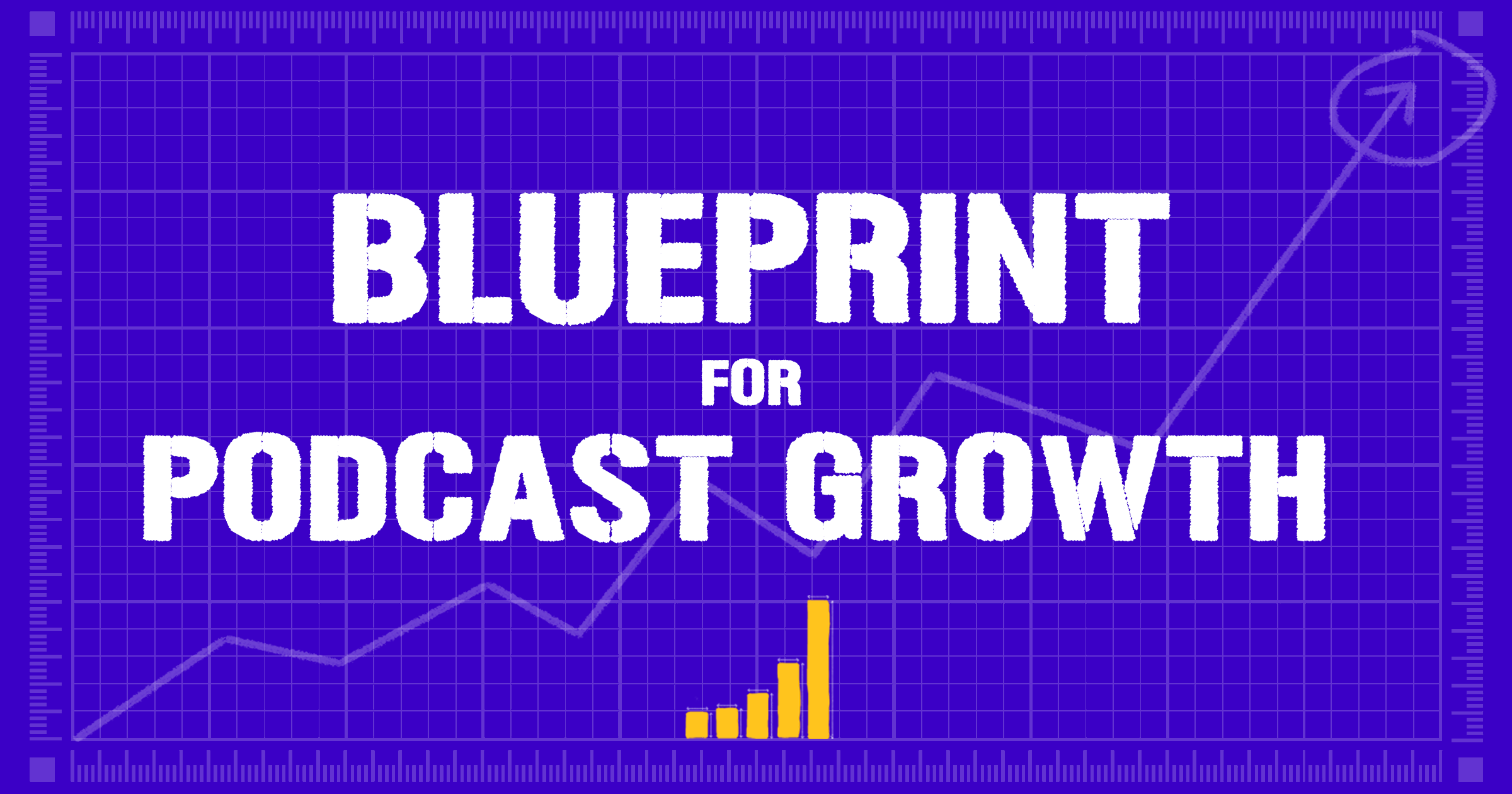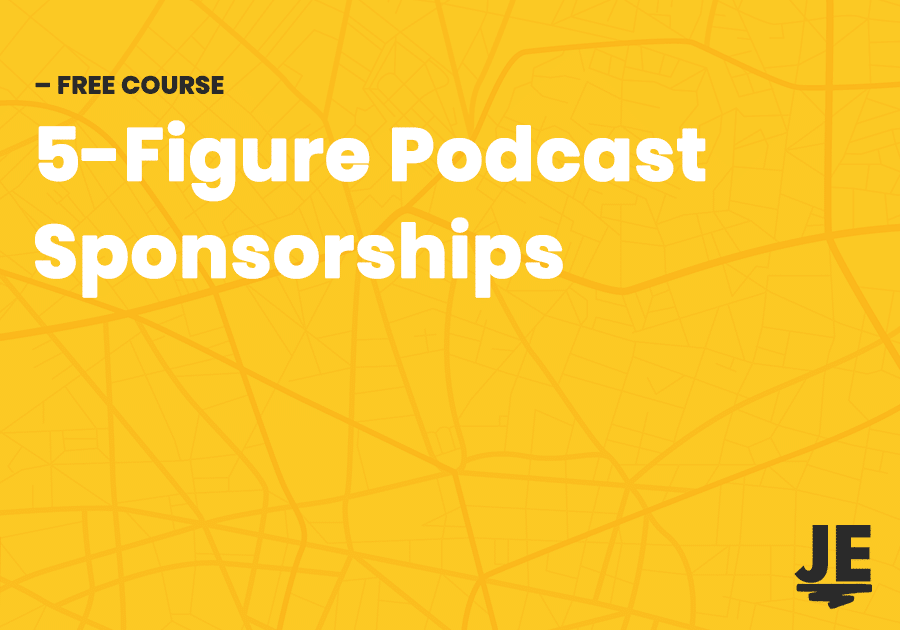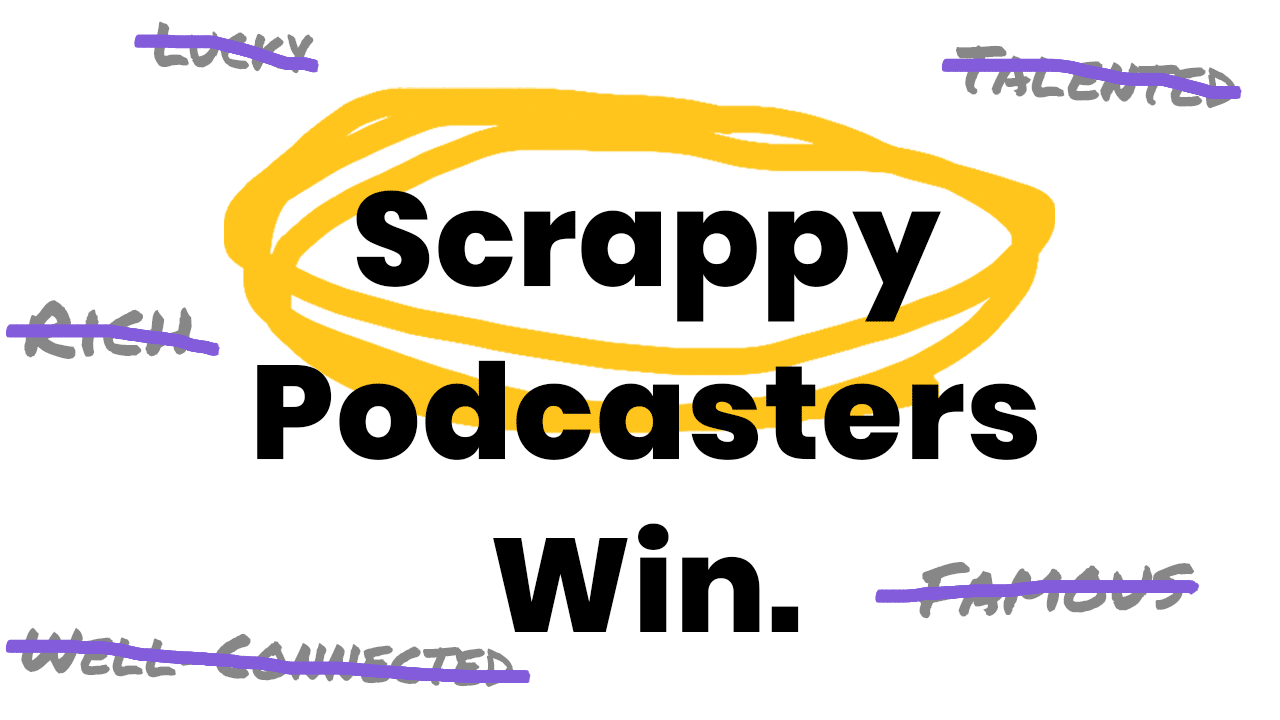When you look at podcasts that grow versus shows that stagnate and struggle to gain listeners, there are a number of potential explanations.
Of course, there’s the level of production quality and the show’s packaging that plays a role in attracting and repelling potential new listeners.
Then there’s the subject matter itself. Is the topic one that there’s sufficient interest in to support the continued growth of the show? Or are there only 100 people in the world who actually care?
Or maybe the potentially-interested audience is large enough but there’s a sea of similar shows against whom it’s difficult to differentiate yourself.
In both cases, however, every month, new shows are started in both tiny and crowded niches that quickly gain traction and outpace similar long-running shows.
We could look at marketing experience, skill, and budget as the driving forces behind these new show’s immediate traction, but that doesn’t explain why some indie shows who do very little marketing take off and many well-financed shows by big networks and media companies flop.
So what gives? Is there a common thread running through shows that gain traction regardless of how competitive their niche or small (even nonexistent) their marketing budget?
It turns out, there is, and it has nothing to do with your marketing and promotion efforts.
Comparing Shows That Grow With Those That Don’t
The difference between growing and stagnating shows becomes more apparent when we group a selection of similarly themed podcasts together and compare them qualitatively.
Now, almost every category will have a cluster of massive incumbents who have been hanging around the top of the charts for years. No offense to them, but they had an early mover advantage not available to the rest of us.
For our purposes, we’re going to ignore these shows, along with those hosted by celebrities, and focus on newer shows that have managed to make a splash… and those that haven’t.
For our example, let’s look at the marketing category, which features hundreds if not thousands of same-y, interview-based shows that could pretty much all be described as “Interviews with successful entrepreneurs and marketers about how they’re growing their businesses, so you can put the same strategies to work for you.”
Almost immediately, we begin to see why most of these shows fail to grow. There’s almost nothing to differentiate them from any of the other similar shows!
When there’s nothing to differentiate your product itself, your only option–much like consumer brands selling commodities–is to try and market your way to the top. While this is technically possible, building the required brand equity to sell a commodity based on brand alone is a long, expensive game.
Sure, it’s also possible for some shows to get lucky and stumble (or maaaaaybe engineer) their way into a windfall of attention that they manage to capitalize on, but these cases are severe outliers, and aren’t worth attempting to replicate.
Good marketers know that the best marketing is baked into the product itself, and when we look at the shows that have managed to climb the charts, we can parse out some of what that built-in marketing looks like.
What Makes A Show Worth Talking About?
When we talk about building marketing into the product (or in this case, podcast) itself, basically what we’re talking about is well… creating a podcast that’s actually worth talking about.
Not by everyone, but by your target audience, the people for whom you have the potential to be the very best in the world.
Despite all the up-and-coming software tools aimed at aiding indie podcast discoverability, the fact of the matter is that the main driver of growth for any podcast is still word of mouth marketing.
This is fantastic news for us as podcast producers. It means that we don’t need to out-market or outspend the networks and media companies and massive, long-running shows. All we need to do is figure out how to make the very best possible show for a highly-specific group of people. A show that they won’t be able to keep themselves from talking about.
But “best” can mean a lot of things, and not all of them matter. So what really makes a show worth talking about?
It’s All About The Journey
When it comes down to it, podcasts that are worth talking about by their listeners add up more than than the sum of their parts.
In other words, they’re not simply a collection of episodes loosely clustered around a central theme.
Instead, these shows have a palpable through-line. A momentum that flows from one episode to the next, leading to a defined end destination.
This end destination, and the route you use to get there is what I refer to as a show’s Concept.
Your show’s concept is about more than just the topic and format of your show. It’s about the journey that your listeners are signing up for when they subscribe–to your podcast, newsletter, social media, but most importantly, your vision.
This end destination might be clearly defined and reachable, much like a true-crime or investigative journalism style show might be. But it doesn’t have to be.
Some destinations (and thus show Concepts) are less immediately-clear. Many fantastic shows are explorations of a topic that hasn’t been explored before, or at least not from the angle they’re choosing to do so.
In these cases, it might not be possible to know when the final destination has been reached, but the concept is the quest to reach it.
To make this idea clearer, let’s look at some example concepts.
Where Are You Leading Your Listeners?
Take the show All Consuming for example, and their show’s description.
Noah Kalina and Adam Lisagor try a new direct-to-consumer product every week, review it, unpack it and explore its space in our lives and its place in our culture.
Notice how they talk about how their goal is to “explore” these new products every week?
Our culture is going through a seismic shift in how the products we use are made, purchased, and distributed. A shift that is shaking the foundation of retail and reshaping the brand/consumer relationship.
Without listening to a single episode, we can imagine an ultra-compelling show that explores this change that we’re all living through with a fun, accessible Concept: Explore the changing landscape of retail, manufacturing, and product consumption one individual product at a time.
While on its surface, All Consuming may appear to be simply a show which has brought the YouTube product unboxing trend to the world of podcasting, it’s anything but.
While each episode features a specific product, the show’s concept itself is about something bigger, and each product is simply a lens through which to view that bigger picture from a different angle.
What Are You Exploring?
There’s a lesson here for any podcaster with an interview show.
If you want to create a show worth talking about, each interview you record needs to be more than just an interview. Remember, we’re looking to create shows that are more than simply a collection of discrete episodes.
Good interview shows, much like All Consuming, use each interview as a lens through which to explore a larger topic. Listeners subscribe, listen through the back-catalog and keep coming back because each episode builds on all of the others, and moves you and your audience collectively closer to the aspirational destination you’ve identified.
More Concept Examples
When you browse through the shows at the top of the podcast charts, you can see that All Consuming’s approach to show Concept is not an outlier, but the rule.
Take Dirt Talk, a Top-20 show about heavy construction and mining, who are “On a mission to “Make the Dirt World a Better Place.”
In looking at their website, we can see that their Concept could be fleshed out further as “Making the Dirt World a better place by humanizing an industry which has long neglected focusing on the people that drive it, and as a result, is struggling to attract new talent.”
Each episode explores the challenges facing the Dirt World (and potential solutions) through the lens of different people working in various roles throughout the industry.
Changing an industry is a big ambitious goal. In this case, it’s also one that almost every single person working in the industry has a stake in. If you’re part of the Dirt World, this is a compelling Concept that is taking on a problem you’ve likely been impacted by yourself.
While there are certainly some straight-up interview shows that appear to lack a clearly defined concept, these shows are almost always either hosted by celebrities, established shows that started 4+ years ago when the competition wasn’t as fierce, or, ironically, incredibly niche.
That last point is perhaps best-driven home by the Thriving Stylist Podcast, which consistently ranks in the Top-10 of the Marketing category of Apple Podcasts charts, ahead of hundreds of general marketing shows, despite the narrow audience.
Britt, the host of the show, has clearly managed to build a best in the world podcast for her audience of stylists.
Is Your Show’s Concept Compelling Enough?
Knowing what we now know about the importance of a compelling Concept when it comes to marketing and growing your show, it’s time to take a good, hard look at the Concept behind your own show.
What is the ambitious destination you’re working towards that your audience is invested in reaching as well?
How does each episode explore that larger topic through a different lens?
How does a sense of momentum and forward progress show up in your podcast? Are listeners compelled to come back for each new episode for the next missing puzzle piece to be put into place?
How can you summarize your Concept into a concise and compelling statement that will perk up the ears of your target listeners as soon as they hear it? Is it easy for them to summarize the Concept of the show for their friends?
If you’re struggling to achieve the growth you’d like to see from your podcast, these are the questions to begin asking yourself.
Keep in mind that it’s easy to draw a frame around an existing collection of loosely bound episodes and call it a Concept, but it’s not. A solid Concept guides your episode topics, guests, marketing, and everything else, not the other way around.
Remember, the best marketing is baked into your show, not sprinkled on top. And the best marketing you can bake in is a compelling Concept that excites your listeners and clearly differentiates your show from every other show in existence.
I’d love to hear the Concept of your show and throw around ideas on how you might be able to tighten it up. Hit me up on Twitter @iamjeremyenns with your idea and let’s have some fun with it!
Or, if you’d like to go deep on building your podcast’s marketing foundation from the ground up, consider signing up for an upcoming cohort of Podcast Marketing Academy.

- Why Wouldn’t They Just Google It? - March 14, 2021
- Before You Can Market Your Podcast, You Need To Create A Marketable Podcast - March 11, 2021
- Podcast Promotion & Marketing Are Different (Here’s How to Use Each Effectively) - March 10, 2021




